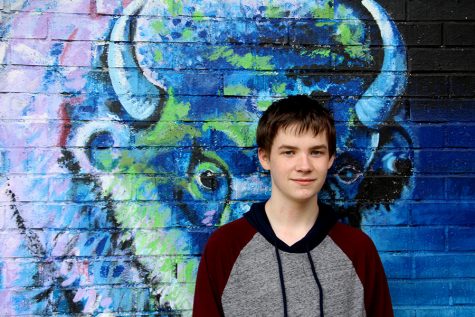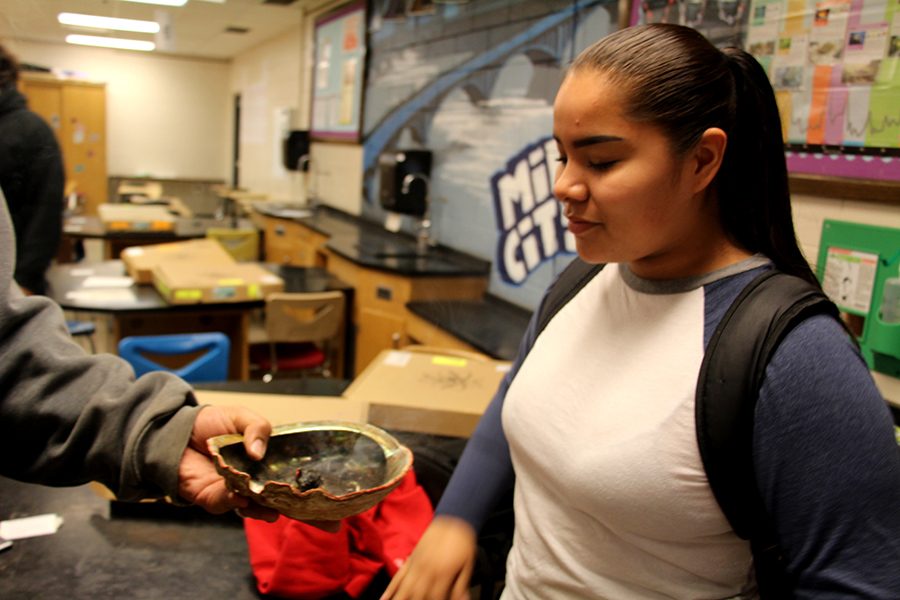Smudging grounds students as they begin their day
All Nations sophomore Ogi Moose receives a shell containing burning sage from Ojibwe teacher Bezh Butler. Students can take part in smudging every school-day morning during first hour.
Just about every morning if you were to enter room 119 at the beginning of first hour, you might walk into something you don’t quite understand. You’d smell smoke, you’d see many students and staff all standing in a circle and someone holding a bowl of burning sage. This is called smudging. Some variation of it is practiced all over the world, and its significance to its participants in the All Nations program paints a clear picture of how beneficial inclusion in this ceremony can be.
Smudging probably isn’t something most reading this right now are too familiar with. It’s a shame that a lot of students here at South don’t understand it, after all there is an invitation open for them to participate any time they like.
Aniah Smith is a freshman in the All Nations program, and she discussed what the purpose of smudging was: “Smudging is a way to cleanse yourself. Say a family member passed away or you’re just having a hard time. You’d smudge so that those sad hard feelings would go away and cleanse yourself, cleanse your soul.”
David “Bezh” Butler is the program coordinator for the All Nations program and is an Ojibwe language teacher. He discussed why smudging is so necessary. “Over time we’ve just developed certain feelings towards things. Loud noises tend to be like ‘oh my god someone’s probably blowing something up over here or a tree fell down’ so something that’s done for a really long time kinda stays with each generation so we just gotta keep doing it, keep moving forward so it continues to be that. If we stop doing that then it kinda breaks the chain and people will start thinking ‘why are we doing this’ and we won’t do it anymore.”
Smith talked about why it was important that South students have the ability to smudge in school. “It’s important because it’s a way for our culture to be provided in school because kids might not smudge at home. They just can’t have the opportunity, so it’s just a good way that here at All Nations we provide that for students.”
Six years ago students had to speak up to make smudging a possibility at South. Butler talked about how these students fought for the ability to smudge. “There was a lot of anger and [the students] went to community people and they came in and said ‘we’ve been doing this at our other school and [in] all of our classrooms and how can we get it done here?’”
South principal Ray Aponte heard these students and worked with the district to make accommodations so that South students were able to smudge at school. “Students wanted to learn and practice indigenous ways and so we worked and the district put a new filtration system in [room 119] and smudging became something that is practiced in the All Nations program,” said Aponte.
Aponte discussed how smudging fit into his larger goals for the All Nations program: “For me it’s about continuing to express the need to allow Native students to practice and learn their heritage and deal with the fact of the historical trauma thats happened to them and trying to get the language back and trying to learn things that were present in the culture… It’s not about smudging for me. It’s about the whole package of trying to get the language back, trying to get spirit and grit back, trying to learn some things that were historical in that particular culture.”
Aponte talked about why he felt it was so important to focus on the All Nations program. “Only 36% of Native children graduate from Minneapolis Public Schools, and it’s very low compared to every other ethnic group, and so it is time to change that, and it’s been that way for 20, 30, 40 years, so this is not a new story. I just decided that while I’m finishing my career, I would make that a priority for me…We’ve put a lot of effort into that particular program over the past three years.”
The story of smudging at South is one that shows the power of the student voice and the importance of a passionate school administration. So in the future if you’re ever walking by the corner of the first floor during 1st hour and you suddenly smell ash, don’t be afraid to knock on door 119.

As he starts his third year on the Southerner, junior Oliver Hall is ready to bring his experience as staff writer to the newer student journalists joining...

Katherine Lundquist is the Editor in Chief of our student run newspaper, and has been on the team since freshman year. Lundquist is invested in nature,...

